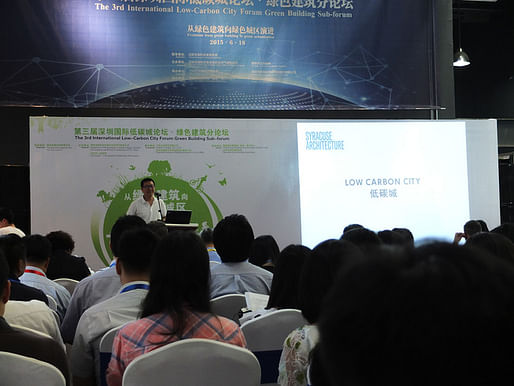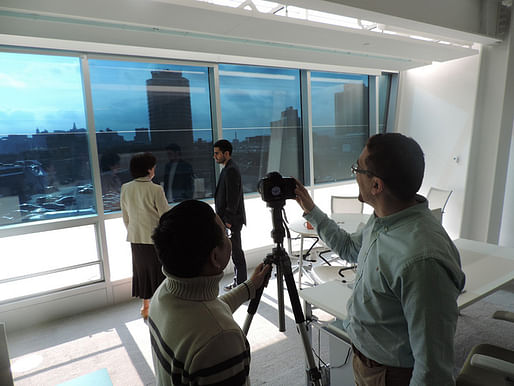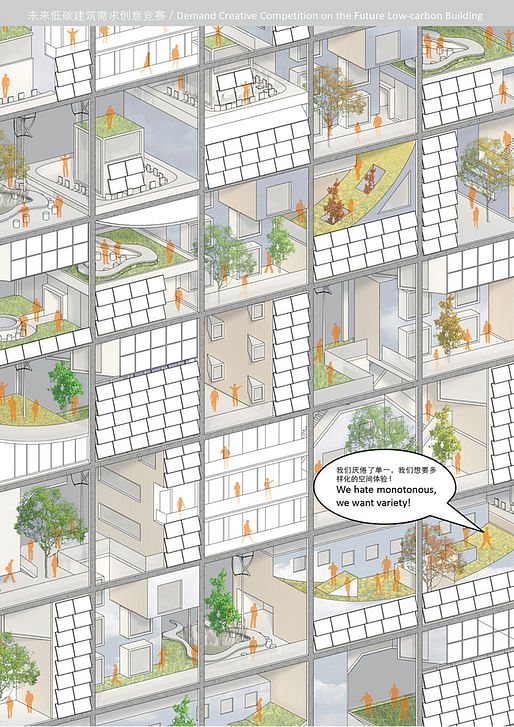
Exciting things are happening at Syracuse Architecture as the School gears up to launch a brand new three-pronged area of study within its post-professional Master of Science (MS) in Architecture. The new curriculum DESIGN | ENERGY | FUTURES is a concentrated research program focused on energy and the built environment, with opportunities for research and the creation of design projects ranging across a variety of scales—from urban design to high performance buildings, from landscape urbanism to building material research and product design. DESIGN | ENERGY | FUTURES will also explore a range of disciplinary and practice areas including adaptive re-use, real estate development and urban planning.
Syracuse's DESIGN | ENERGY | FUTURES strand launches fall 2016, and will require registered students to complete 30 credit hours, typically over the course of three semesters, one of which may be spent in residence at one the School’s centers in New York City, Florence or London.
Student's coursework will consist of two required studios, one of which is to be paired with a prototyping research seminar, and a series of electives intended to complement the design and research studio projects. Applicants holding a professional degree in architecture, landscape architecture, urban design or urban planning are being encouraged to apply, though applicants in related disciplines such as management, engineering, geography, environmental, graphic or product design may also be admitted at the discretion of the School’s admissions committee.
DESIGN | ENERGY | FUTURES has been developed by Syracuse Architecture faculty, Syracuse affiliated faculty and the School’s postgraduate academic advisory board. A large number of world-class teachers and researchers will collaborate to ensure a postgraduate research environment of the highest quality.
As the School prepares for fall 2016 enrollment, it’s worth taking a closer look at the recent successes of two Syracuse Architecture professors working right now at the cutting-edge of sustainable design. Looking forward, both professors will play a key role in the delivery of the School’s MS program.

The Performative Praxis Lab
In collaboration with the existing Syracuse Center of Excellence (CoE), Assistant Professor Tarek Rakha (Ph.D, MIT) has recently established a new research initiative in Syracuse: the Performative Praxis Lab (PPL). The lab’s goal is to influence the environmental responsiveness of the next generation of buildings through applied research into built environment practices and through the development, validation and prototyping of workflows that enable designers to comprehend the ways in which design and operational decisions can impact upon environmental performance. Under Dr. Rakha’s guidance, the Syracuse Architecture PPL is dedicated to seeking out new approaches to the design of sustainable buildings and communities, and to the mitigation of the effects of climate change. For Dr. Rakha, the PPL’s mission is simple: To forge a team of researchers capable of shattering existing boundaries between the numerous disciplines concerned with sustainable design.
So far Dr. Rakha’s PPL team has focused on the preparation of a study of residential LEED certified buildings practices from a sustainability and entrepreneurship perspective. This study was funded by the Sustainable Leadership Enterprise at Whitman College in conjunction with the U.S. Green Building Council (USGBC).
Another of Dr. Rakha’s current PPL research projects investigates models of sustainable urban mobility intended to create walkable and bike-able cities. Here, the City of Syracuse acts as an open-air laboratory for the development of new multimodal transport options designed and tested using the very latest urban performance simulation tools.
Dr. Rakha is also part of the development team for a new urban modeling tool, ‘UMI’, first developed at MIT. The PPL plan to use ‘UMI’ in a range of forthcoming projects. The PPL team will also shortly be embarking upon a range of new studies including one into the use of electrochromic glazing in office buildings, making use of the Syracuse University’s downtown Center of Excellence as a lab for rethinking the way we live today so that we might reshape tomorrow’s cities.

The Low Carbon City
If Dr. Rakha’s research envisages a better future for the planet through research grounded close-to-home in Syracuse, NY then Assistant Professor Fei Wang’s recent work reminds us of the need for today’s students to be aware of events taking place on a broader stage. To this end Fei has recently taught design studios at Syracuse Architecture on the planned Pingdi Low Carbon City (LCC) to be located in Shenzhen, China.
This past spring Fei's studio research focused on the urban morphology of the LCC, and this fall the studio has focused on the design parameters governing the architectural design of the LCC’s downtown area. Currently, the studio is basking in the success of six of its students - each of whom won a number of prizes in a recent international competition associated with the LCC. Professor Wang also conducted research on the LCC during the summer of 2015 in collaboration with researchers at Harvard University, Columbia University, the University of Hong Kong, and the University of Cincinnati.

As Syracuse Architecture prepares for the arrival of its new cohort of DESIGN | ENERGY | FUTURES MS students, Fei will continue working on the political, social, economic, cultural, and technological issues associated with the delivery of the LCC, and in building ever stronger relationships between Syracuse University’s architecture, mechanical engineering, and geography departments, Nanjing University and the new Institute of Building Research in Shenzhen, China.
Further details of the application process for Syracuse Architecture’s new MS program can be found here: https://soa.syr.edu/ms
Please note that this program does not meet the licensure requirements to become an architect in New York and is not considered licensure qualifying in New York.
No Comments
Block this user
Are you sure you want to block this user and hide all related comments throughout the site?
Archinect
This is your first comment on Archinect. Your comment will be visible once approved.